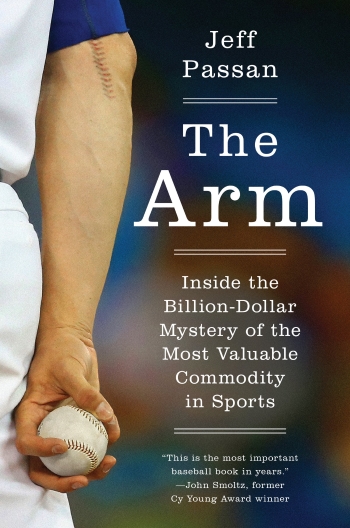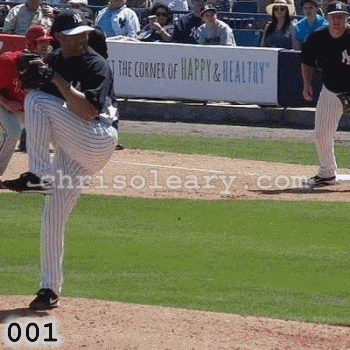The Epidemic > Comments on Jeff Passan's The Arm

Jeff Passan's The Arm is a fundamentally dishonest book.
As I discuss in this and a couple of other pieces...
...Jeff Passan makes his "case" against my work and me (see pages 263-268) through a combination of deliberate omissions and out of context quotes, driven by what I believe is confirmation bias (at best).
For instance, while Passan correctly tells you that I initially loved Matt Harvey's mechanics, he ignores everything I've said about Harvey since early 2008. If, unlike Jeff Passan, you are interested in the truth about what I said about Matt Harvey, see my...
Similarly, the quote that Passan uses to finish off his 6 pages about me is one in which I quote other people and what they say about me. The implication is that Passan caught me revealing my true agenda.
The truth is the opposite.
I go to great lengths to document and make sure that people understand that my predictions are all made BEFORE the pitchers in question broke down, as you will find if you check out The List.
With respect to confirmation bias, Jeff Passan interviewed me once, for an inning or two, at a Cardinals game. Given that I was unable to go over much of my work or my process, he said on multiple occasions that he would conduct a follow-up interview so that I could discuss my work in detail. One of those promises of a follow-up interview occurred after I correctly predicted (in advance) Jose Fernandez's elbow and shoulder problems in my...
But he never did.
Yes, he contacted me after The Arm was finished and in galleys, but even then he never sent me a galley or an excerpt, much less interviewed me, and I was unable to comment on anything he had written in The Arm. If, unlike Jeff Passan are interested in the truth, here's a...
Executive Summary
Jeff Passan's The Arm is a hatchet job in its purest, most brazen form; it combines willful ignorance, out-of-context quotes, and a heaping helping of confirmation bias to paint a picture that bears remarkably little resemblance to my true positions and work.
Willful Ignorance
The biggest problem with Jeff Passan's The Arm is that he makes his case, such as it is, by ignoring essentially everything I've done and said since early 2008.
The best example is his description of my comments with respect to Matt Harvey. The problem is that he ignores the vast majority of my analysis of Matt Harvey's pitching mechanics.
He would have you believe that the last 90% of that piece doesn't exist.
My Story
I got into the pitching mechanics analysis business with a simple goal in mind; I was a father who wanted to keep what happened to me -- and to my shoulder -- from happening to my kids and their friends.
Since 2005, I have been researching every topic relevant to the pitcher injury and Tommy John surgery epidemic that I can find. That means...
- Keeping up on the science and reading literally every relevant journal article, many of which I cite or discuss in The Science Behind The Epidemic and Dominant & Durable.
- Analyzing the pitching mechanics of pitchers like Matt Harvey, Stephen Strasburg, and Jose Fernandez in an effort to make people aware of the problematic movement patterns that caused their injury problems and that are widely taught.
- Refining and proving my Pitcher Injury Risk Rating Algorithm by publicly making predictions via Twitter and then compiling them on The List.
- Staying in touch with MD's and researchers whose work is relevant to or comments on my own work and supporting them with still pictures and video clips from my library and insights gained from my observations of pitchers of all ages.
- Attending 50 to 60 major league baseball games each year since 2009 and filming virtually every pitch or at-bat with one or more of my multiple high-speed (120fps or better) cameras.
- Building a still image library of pitchers, which I then use to create my flipbooks, photographic studies, and other teaching aids.
- Keeping people informed of my latest observations, theories, and findings via my public and private web sites as well as my Twitter feed @thepainguy
With The Arm, Jeff Passan had the opportunity to assist me in my efforts. Unfortunately, while he initially seemed receptive to my work and the idea that pitching mechanics are relevant to solving the epidemic, over the past few years something changed.
As a result, instead of being something that will stop the epidemic in its tracks, I fear that The Arm will instead contribute to the destruction of another generation of young arms.
And, this time, not just the arms of pitchers.
Out-Of-Context Quotes
Jeff Passan ends his discussion of my work with the following quote...
People will criticize me for stuff because I'm changing things and making all these exceptions after the fact.
The problem is that, as Jeff Passan fails to make clear, what I'm discussing is what other people say about my work.
A more accurate version of that quote would be...
People will criticize me for stuff, (saying) I'm changing things and making all these exceptions after the fact.
In truth, I am constantly being criticized my making predictions after the fact. As a result, the reason why I make predictions via Twitter and then post them to The List is precisely so I can prove what I said when. I also point people to cached versions of my web site so they can verify my statements, as I do in my discussion of Mark Prior's pitching mechanics.
I have no record of e-mailing such a statement to Jeff Passan, so it could only have come from his (one and only) August 2013 interview of me, an interview that took place on the day that Matt Harvey went on the DL and that I explained to him the whole truth about my interactions with Ed Harvey. When he releases a transcript of his interview with me -- he recorded the 42-minute interview on his phone -- it will become clear that his use of that quote out of context is a fundamentally dishonest act.
That problem could have been easily fixed when the book was in galleys, but Jeff Passan never sent me a galley or even the portion of the book that was relevant to me.
Problems with the Truth
Given that The Arm requires that you trust that Jeff Passan did his best to maintain his objectivity, the fact that he has problems with the truth should give readers of The Arm pause.
In my correspondence with him in the weeks leading up to the release of The Arm, one thing that came up was what I had told him about my interactions with Dr. Wiemi Douoguih, the now-former medical Director of the Washington Nationals. After telling him that Dr. Douoguih had invited me to D.C. to speak at an event, an event that had to be cancelled due to the sequester, Jeff Passan replied with...
I asked Dr. Douoguih about the sequester thing and he said he never asked you to come speak.
I was shocked by this, so I sent Dr. Douoguih, who I had and continue to have a good relationship with, a quick e-mail. Dr. Douoguih replied with...
I never told (Jeff Passan) that we didn't invite you. I would not say that.
I didn't realize this study would create such a firestorm.
I told him that our data showed an increased injury rate requiring surgery in pitchers who exhibited the inverted W, it just didn't reach statistical significance. Because it did not reach statistical significance I can't make the claim that the inverted W increases injury risk.
My hunch is that it does.
I appreciate your pioneering efforts and would never try to discredit your work in a malicious fashion like that. I know we don't really know each other that well but I do hope that you don't get too down on yourself because people want to shoot down your effort to shed light on a complex subject.
It usually means that you're on to something.
Aside from lying to me about what Dr. Douoguih said -- I literally can't understand why Passan would do that, given how easy it was to e-mail Dr. Douoguih and check -- there's also the issue of how Passan wants to believe Dr. Douoguih's work reflects on my own. As the note implies, Dr. Douoguih believes I'm on to something, in large part because a study of the Inverted W he commissioned after hearing my theories says just that.
What the not so durable guys do is they take their elbows back but they also take them up. Now, that's actually painful to do, but it's not that bad in and of itself. The problem is that when you take the elbows back and up, you can end up with a Timing problem.
The quote above is from a 2010.08.31 interview about Stephen Strasburg's pitching mechanics and the Inverted W with 106.7 The Fan in Washington D.C. that led to Dr. Douoguih's study of the Inverted W.
Confirmation Bias
Confirmation Bias: a tendency to search for or interpret information in a way that confirms one's preconceptions.
There were a number of major problems with Jeff Passan's process of interviewing me.
First, as the interview took place in my seat at a Cardinals game -- I remember thinking, "Holy shit. This is the interview?" -- I was unable to show Jeff Passan the full extent of my research to date. Instead, I only had one of my high-speed cameras and my iPad. Yes, the iPad had upwards of 25,000 (now 100,000) still images and image sequences on it, but that was only a tiny fraction of my research base. I attempted to show him what I had on my iPad, but he cut the interview off at 32 minutes and returned to the press box in order to beat the traffic.
Second, and despite his promises to the contrary, the August 26, 2013 interview was the only one Jeff Passan would conduct with me. He told me that he had two interns working with him, and they would contact me for access to my client-only web site, but that never happened. Passan e-mailed me in April 2014, expressing interest in doing a follow-up interview, to which I agreed, but I never heard back from him. Passan contacted me a third time shortly after my predictions about Jose Fernandez having shoulder problems came true, and I texted him and told him I'd be glad to talk, but he again never followed up.
Jeff Passan finally followed up with me in January of 2016, after he finished the book and it had gone to galleys. I honestly don't know why he contacted me, because he never sent me a galley, or even an excerpt of the section that discusses me, so I never had an opportunity to see, render an opinion of, or clarify anything that he had written about me.
I assume it was just a token, cover-your-ass move that enabled him to say he did follow up (but too late to impact anything in his book).
Finally, and critically, to my knowledge Jeff Passan has never followed me on Twitter @thepainguy. That is a huge problem because, in the interests of openness and getting the latest information out quickly, I essentially live-blog my research on Twitter. If you want to know what I'm thinking at the moment, see what I'm Tweeting about. Of course, not following me on Twitter would allow one to maintain one's view and not have to be confronted with pesky things like facts and the truth.
I believe some the reason why Jeff Passan never followed me on Twitter or followed up on his interview requests has to do with his relationship with Kyle Boddy. As I point out above, Boddy has no problem repeatedly lying about me in print, and I have to wonder if Jeff Passan has bought into some of those lies.
All of this makes me wonder if a big part of the problem could be confirmation bias.
It's normal to want to insulate yourself from ideas that might call your own into question. I fight it every day. However, while I constantly work to keep my mind open, it doesn't seem like Jeff Passan has learned that lesson. Instead, he seems to have made up his mind years ago and ignores every piece of advice to the contrary, including much of the science behind The Epidemic.
The Smoking Gun
I believe this February 1, 2016 e-mail from Jeff Passan is the best evidence that he has fallen victim to Confirmation Bias...
Here's what I want to know: You take pains to say the Inverted W can cause injuries. When can it, and when can't it? What's the difference between those two cases? And is your basis of this something that has been studied or just a hunch?
I would hope that anyone who is minimally familiar with my work, much less someone who thinks they know enough about it to discuss it in a book, would know the answer to this question given that I first answered it in late 2007 and a year ago put together a piece to that answers that question in its title...
What's more, I constantly -- and I'm sure to some, annoyingly -- tweet about the answer to that question, but I want to make sure people are crystal clear about what I believe.
I literally don't know what else to do, given that the answer to Jeff Passan's question is in the title of that first piece, a piece I put together a year ago specifically so he can't act like I never answered that question. Hell, I even mark my Timing-related tweets with #Timing so that even the dullest knife in the drawer knows what I'm talking about.
I don't accuse people of confirmation bias lightly, but the fact that Jeff Passan thinks that's still an open question suggests that confirmation bias is preventing him from fully (or even minimally?) acquainting himself with my work so that he doesn't have to question his beliefs about me.
Straw Man
Straw Man: a sham argument set up to be defeated.
One of the more laughable things Jeff Passan has accused me of is fixating on the Inverted W.
What's funny about this is that the first time we met was at a Cardinals game on the day that it was announced that Matt Harvey had a torn Ulnar Collateral Ligament. As it turns out, and as I explain in my analysis of Matt Harvey's pitching mechanics, I was very familiar with Matt Harvey's pitching mechanics, as his father contacted me in late 2007 to have me analyze Matt's mechanics and look for the Inverted W or any other red flags in his mechanics. As I told Ed Harvey, Matt had no problem with the Inverted W, an arm action Ed specifically rejected when training Matt.
I can guarantee that in our conversation, I made it clear to Jeff Passan that Matt Harvey's problem wasn't due to the Inverted W, and that established that there was an underlying root cause that was getting the arms of pitchers who made the Inverted W and those who didn't.
Timing.
In August 2010, I was interviewed about Stephen Strasburg's Pitching Mechanics and the Inverted W by a D.C. radio station. This piece provides a good overview of my views on Stephen Strasburg's pitching mechanics, his long-term fate, the Inverted W, and the ultimate root cause of Stephen Strasburg's problems. In that interview, which took place three years before Matt Harvey's injury and Jeff Passan's interview of me, I discussed my current view of the root cause of the arm problems that so many pitchers were -- and are -- experiencing.
What the not so durable guys do is they take their elbows back but they also take them up. Now, that's actually painful to do, but it's not that bad in and of itself. The problem is that when you take the elbows back and up, you can end up with a Timing problem.
When I talk about a pitcher having a Timing problem, I mean that their arm isn't up and in the Ready Position at the moment their front foot plants, their shoulders start to turn, and their arm starts to accelerate and go under load.
Since late 2007, I have made it clear that the root cause of the injury problems that pitchers are experiencing isn't solely arm actions like the Inverted W. Rather, the root cause of the problem is the impact those arm actions have on a pitcher's Timing.
So why do I still tweet about the Inverted W?
Because that's the keyword that people are searching for.
While people need to understand that Timing is the root cause of the problems that many pitchers experience, they don't know that. All they know is that there's this thing called the Inverted W that some people think is bad. What I'm doing is targeting the Inverted W and related keywords, which people ARE familiar with, and then steering them toward the concept of Timing, which most people are not familiar with.
But need to be.
Ignoring the Science
Exactly what science is Jeff Passan ignoring?
As I explain above, he would have you believe that Dr. Douoguih's study refutes my work when in truth, and as Dr. Douoguih states above, it backs up what I said about Stephen Strasburg's pitching mechanics in 2010.
What the not so durable guys do is they take their elbows back but they also take them up. Now, that's actually painful to do, but it's not that bad in and of itself. The problem is that when you take the elbows back and up, you can end up with a Timing problem.
As I explain in my piece on Premature Pronation, studies suggest that pronating early on in the delivery is problematic. As Davis et al found in their 2009 study...
We believe that the hand-on-top position initiates early shoulder abduction while delaying humeral external rotation because when the forearm is pronated, the humerus remains internally rotated. This causes the shoulder to abduct while delaying humeral external rotation.
While Davis (2009) implies that pronating and delaying external rotation is good, as I explain in the science behind The Epidemic, Dr. Cynthia LaBella found in 2011 that delayed external rotation correlates with increased pain in young pitchers.
The pain group had greater internal shoulder rotation at the initiation of external rotation in the stride.
Science-Based is Still Scientific
Another line of attack that Jeff Passan has employed is to deride my work as not based on science.
In general, my view is that you don't have to do science for your work to be science-based.
As I discuss in the science behind The Epidemic, I've read literally every relevant study.
Premature Pronation
Our interactions with respect to the concept of Premature Pronation make me wonder whether Jeff Passan is having a problem with confirmation bias, given his approach and tone.
It's perfectly appropriate for a reporter to ask a, "But what about?" question. But that's not what Jeff Passan did. Instead, his tone was dismissive rather than inquisitive...
Here's Catfish Hunter showing it to CF...

Catfish Hunter
And Sandy Koufax:

Sandy Koufax
And Mickey Lolich:

Mickey Lolich
Same with Don Larsen (photo is in a series).
If I looked, I'm guessing I could find a lot more of them.
For those who are actually interested in my opinion of those pictures, what you see in Catfish Hunter (and Jim Morris) is more the result of adduction via scapular retraction than Premature Pronation.
Sandy Koufax's front foot isn't planted, so it's too early to say whether he exhibits Premature Pronation or not. Of course, Koufax is also a spectacularly bad example to try to say that Premature Pronation is no big deal, given that Koufax's career was cut short by elbow problems.
Mickey Lolich is an interesting case, because his front IS planted. However, very few pictures, and very little video, exists of him, so it's hard to say exactly how he moved.
What About the Still Photos?
Jeff Passan, I assume because he's following Kyle Boddy's lead, has taken to criticizing me for my use of still photos in some of my analyses.

Ivan Nova and Mariano Rivera
However, that ignores the fact that both still photos and high-speed video have their place.

Mariano Rivera 2013
Similarly, still photos were the key to understanding what happened to Cliff Lee. While his Timing looks good in the multiple videos I have of him, the resolution wasn't high enough to allow me to see the Premature Pronation in his pitching arm...

Cliff Lee
...that was easily visible in still photos and that led to the elbow problems that ended his career.